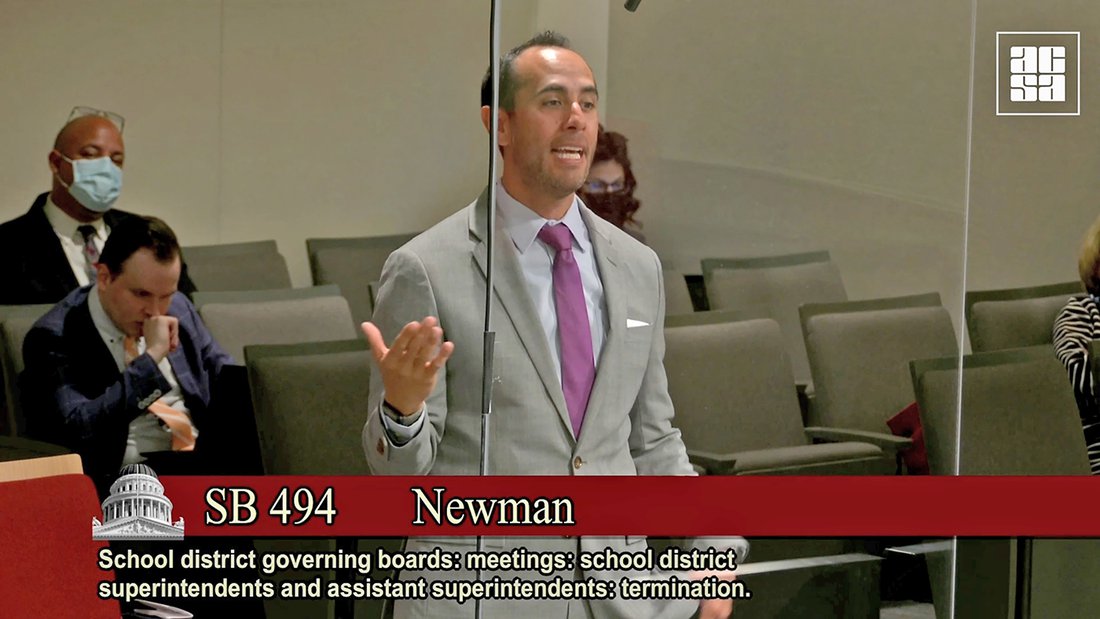
ACSA Executive Director Edgar Zazueta testifies on behalf of SB 494 (Newman), a bill sponsored by ACSA that would require more public notice and a “cooling off” period before a school board can take action to fire superintendents without cause.
ACSA testifies in support of SB 494
Bill would require more public notice, ‘cooling off’ period before boards can fire superintendents without cause
May 1, 2023
ACSA is sponsoring a bill that would require more public notice before school boards can terminate a superintendent without cause.
On April 19, ACSA Executive Director Edgar Zazueta provided testimony before the Senate Committee on Education in support of Senate Bill 494 (Newman), which would modify California Education Code to require:
- 72-hour notice before a public meeting to terminate a district superintendent and/or assistant superintendent without cause.
- A 30-day “cooling off” period wherein a newly elected school board may not take action to terminate a superintendent or assistant superintendent without cause.
“SB 494 will ensure greater transparency and accountability in school district governing board proceedings and ensure stability and transparency in school district governance,” said the bill’s author, Sen. Josh Newman, in a joint news release with ACSA. “Meetings of school boards where the termination of school district leadership may be considered should occur only with sufficient public notice, thereby providing an appropriate opportunity for public engagement in the kinds of major personnel decisions that have far-reaching effects.”
Current Education Code requires 72 hours of public notice before a regular board meeting, but only 24 hours of notice before a special meeting.
There has been an increase in concern surrounding the current law since the Orange Unified School District fired its superintendent and assistant superintendent in January. The board called a special meeting with 24-hour notice during the district’s winter break, while both the superintendent and assistant superintendent were out of the country. During the same meeting, the board also appointed an interim replacement, who resigned a mere five weeks later, leaving the school district without a leader.
“We’ve been hearing about a number of these cases throughout the state,” Zazueta told lawmakers during his testimony, referencing other instances in Shasta, Riverside, Kern and Placer counties.
ADVERTISEMENT
Zazueta shared that stable school leadership has a direct correlation on student outcomes and the district’s ability to attract and retain educators.
He called SB 494 “sensible and sound policy” that would ensure public participation in an important decision that impacts students, staff and the community.
“If we’re going to make sure that we have ample time to give the community a chance to have their voice heard when somebody’s going to get hired for the position, shouldn’t we provide the same ample notice and transparency when we’re going to exit somebody from the system?” Zazueta said. “We think this is a common sense, simple bill that will give the community and all the stakeholders a chance to engage in that conversation.”
Orange USD Trustee Kris Erickson also provided testimony to the committee on the fallout from the board majority’s actions.
“The sudden and unexplained purge of our top two administrators … has destabilized our district,” she said. “It’s instilled fear and anxiety in our employees, students and parents.”
The termination cost the district $1 million in General Fund revenues, Erickson said, adding that funds could have been spent on students. She also read comments from student board members about how the decision has impacted them.
During a session at ACSA’s Legislative Action Days earlier in the week, Newman told school leaders how the bill would mitigate the political impulses of school board members.
“Education has become the new battleground for the culture wars, and that’s really unfortunate,” he said, adding that these battles distract educators from their main goal of raising student achievement.
Newman said changes in school board leadership are to be expected (“that’s what elections are about”) and that the state ultimately has a limited role in what happens with local school board decisions.
“Our job at the state level is to create a roadmap and a set of guidelines that mitigate those impulses — that protect, to the extent possible, education generally, but all the participants within education, and that’s what SB 494 is about,” he said.
SB 494 will improve transparency and community awareness when changes in non-elected school leadership are under consideration. It will also help school board members gain a more complete understanding of their district, thereby better equipping the governing body to responsibly deliberate and act upon significant personnel decisions over which they have direct authority.
ADVERTISEMENT
Contact Us
www.acsa.org
© 2023 Association of California School Administrators



